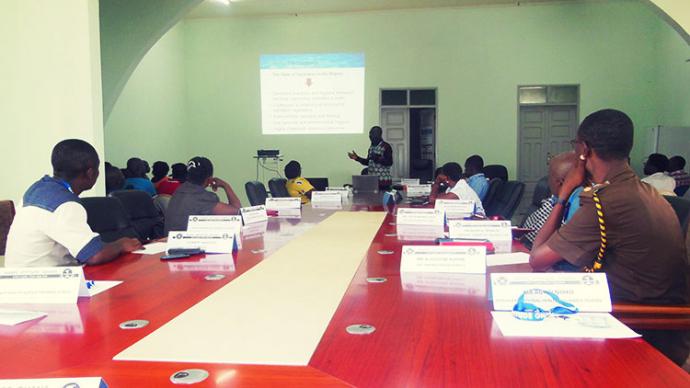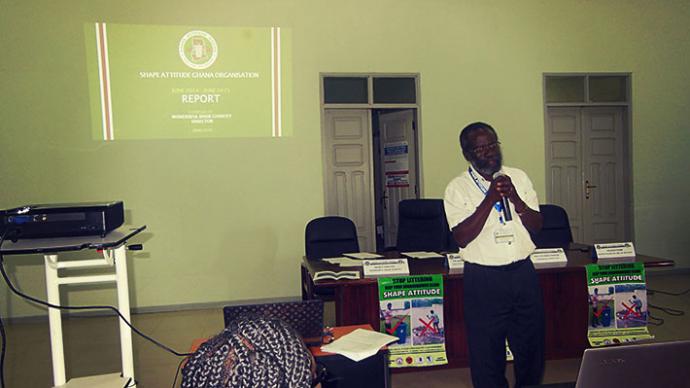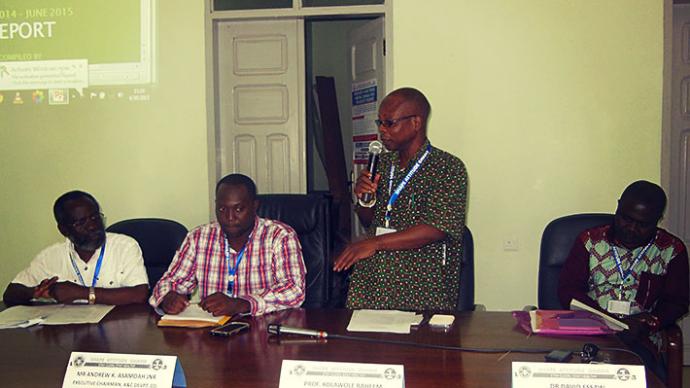Shape Attitude Ghana Celebrates First Anniversary

Shape Attitude Ghana in collaboration with the Centre for School and Community Science and Technology Studies of University of Education (SACOST/UEW) Winneba, held a review meeting on 30 June 2015 to mark the first anniversary of Shape Attitude Ghana.
Shape Attitude Ghana is an organisation running a project on “Sanitation, Health, Attitudes and Practices for clean Environment” (SHAPE) with the aim of enabling communities to develop a culture of keeping their surroundings clean through sensitisation. The project’s primary target population is young children from age three. The sensitisation drive for changing attitude on littering and open defecation takes place in schools, churches and communities.
In his opening address, the chairperson of the occasion, Mr Andrew K. Asamoah of A&C Development Company noted that attitudinal change cannot be effective without corresponding support of local and central governments to provide the necessary infrastructure and facilities for disposal of waste. Mr Asamoah called on local and central government as well as churches, schools and non-governmental organisations to be actively involved in educating people to change their attitude on littering. The local authorities should ensure that disposal facilities are provided at vantage points and removal and disposal of waste is ensured.
Dr David Essaw, a research fellow from the Institute for Development Studies, University of Cape Coast and also Chief Technical Adviser to Shape Attitude project presented an overview of community environmental issues. Dr Essaw stated that poor sanitary conditions in the country were due to poor attitude and practices, inadequate or lack of infrastructure, interference in law enforcement, and inappropriate prioritisation and allocation of resources. He admonished environmental students present at the meeting to take on the mantle as teachers in the educational institutions to promote clean environment.

The founder of Shape Attitude Ghana, Wonderful Baisie Ghartey, in his report on activities implemented recounted awareness and demonstrations talks in twenty schools, eight churches and several talks at the University of Education. At the community level, there were talks and demonstrations at the Ghana Prisons for Prison officers in Winneba, food vendors, National Health Insurance Scheme Office in Winneba and the Ghana Private Road Transport Union (GPRTU). The two radio stations in Winneba, Windy Bay and Radio Peace FM offered free air time for sensitisation talks and discussions.
Shape Attitude Ghana acquired 329 posters 43 trash bins for distribution to schools.
Observations made over the period under review were that it was a common knowledge among the school population, the community and religious bodies that indiscriminate littering and dumping of refuse constituted a major challenge to waste management and good sanitary conditions in our communities. It was also generally accepted that the practice of indiscriminate littering and dumping was attributed largely to “ATTITUDES and PRACTICES.” Shape Attitude project was, therefore, widely accepted by all the stakeholders. Feedback from the University, some schools and churches indicated that the project was making an impact. Interview schedule for knowledge, attitude and behavioural practices (KABP) study which was completed in January 2015 will be administered as soon as funding is secured. This will provide a baseline to measure performance.
The challenges the organisation is facing are inadequate human, material and financial resources. The project has so far relied on volunteers who are in full time employment and therefore not readily available as required. The project is highly underfunded with expenditure far exceeding donations received by more than 345%. Pledges have been received from SACOST/UEW; Prof Akwasi Asabere-Ameyaw, Vice Chancellor of University of Education; Akwantufo Welfare Club and some private companies and individuals for material and/or financial support. The immediate needs are educational materials, trophies for awards, trash bins, support to conduct baseline survey and transportation costs.
Inadequate or lack of infrastructure was cited several times during the project development, at the consultative meeting and implementation as a factor impeding the effort to stop littering and indiscriminate dumping. The communities made suggestions for waste management including, sorting, recycling, incinerators for burning, and law enforcement.

The Head of SACOST/UEW, Prof. Kolawole Raheem, added his voice to the call for graduate students to play active role in the sensitisation. He stressed the importance of practical issues such as environmental education in the school curricula including the tertiary level. Prof. Raheem went on to state that hospitals should be targeted on their disposal of waste. He praised the Late Nii Emphraim, former Chief Executive of the Effutu Municipal Assembly for his role in championing the campaign for environmental protection.
The 40 participants at the meeting were drawn from the University of Education, the Environmental Health and Sanitation Department, the Health Promotion Unit of the Ghana Health Service, Ghana Education Service, the Ghana Police Service, The Ghana Prison Service, religious organisations, A&C Development Company, the World Health Organisation (WHO) and Akwantufo Welfare Club.
View More Photos of the Occasion Here

Add new comment